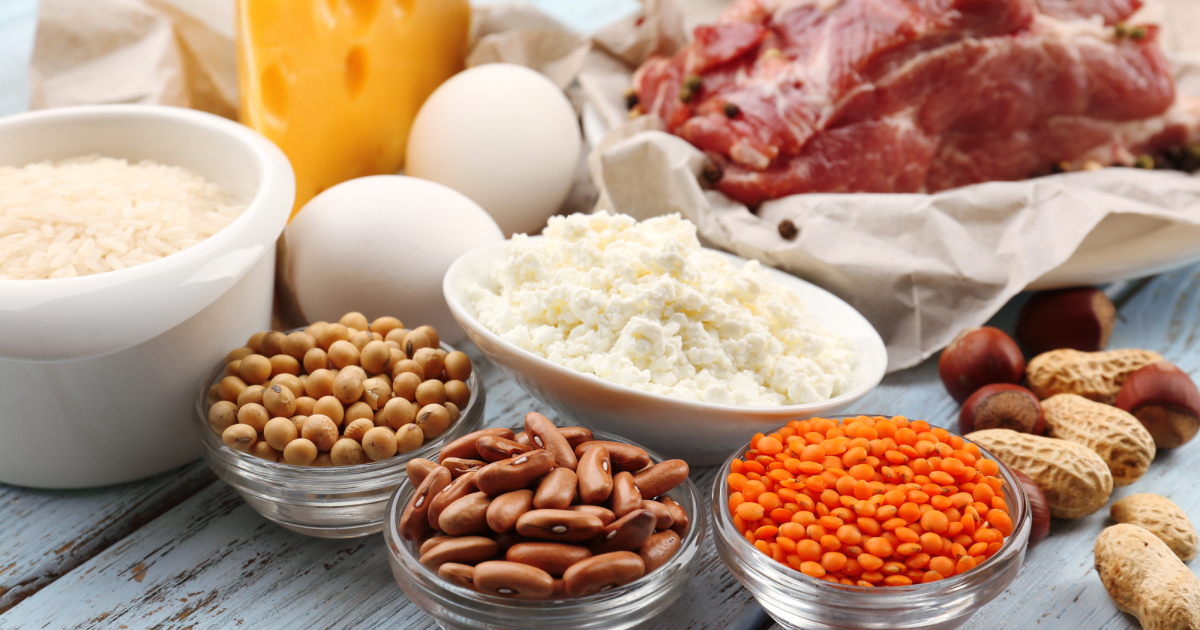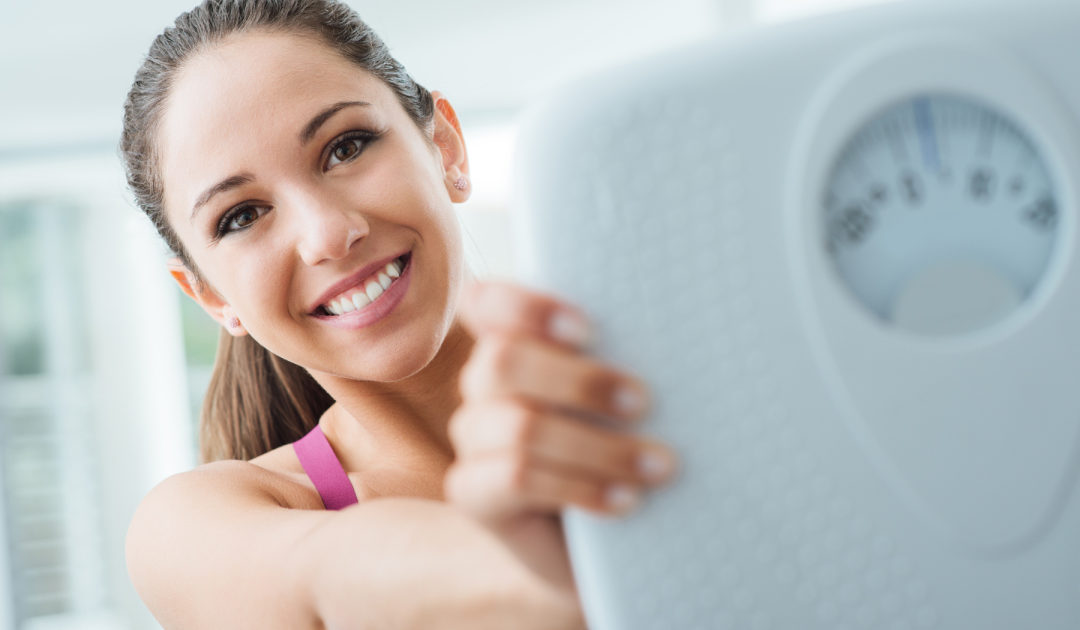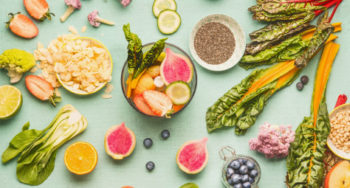It’s tempting to think of your metabolism as an internal speedometer... or maybe like a hamster running on a wheel.
The faster it goes, the faster you burn calories and fat, right? Unfortunately, that's not how it works.
In reality, your metabolism is a complex biochemical process that your body uses to convert what you eat and drink into energy.
Metabolism happens at its most basic level in your cells. That’s where the calories in everything you eat and drink are combined with oxygen. This process releases the energy your body needs to function.
What affects your metabolic rate?

There’s a big list of factors that can affect the rate at which this process happens, some which you can't change (like your age and genetics) and others which you do have control over, like:
- FOOD CHOICES – Eating a balanced, whole-foods-based diet with enough protein and fiber can help boost your metabolism and keep you feeling full. Drinking 8-10 glasses of water a day will also make a big impact!
- EXERCISE – Nearly all workouts can help you burn more calories, but strength training and high-intensity interval training workouts can give you some bonus burn after your workout is over.
- STRESS – When you are stressed, it can affect your body’s hormones, which can in turn make your body burn fewer calories (and store fat).
- SLEEP – Not getting enough sleep also affects your hormones. You can end up feeling extra hungry AND burn fewer calories (this is why I talk about sleep so much!).
- OTHER ACTIVITY – This is a secret weapon for metabolism! Basically, the more active you are OUTSIDE your workouts, the more calories you burn all day. It can add up fast.
Here’s the best thing that no one talks about when it comes to those 5 components: when you get them working together, not only does your metabolism rev up... but you also FEEL GREAT.
You’ll feel more energized, lighter on your feet, and you might even start to hear people comment on your healthy “glow!”
Ready to boost your calorie burn and accelerate your weight loss results? Join our 5 Day Metabolic Jumpstart Challenge and get the inspiration, support, and guidance you need to achieve your goals.
How to burn more calories, the natural way
There’s actually a lot you can do to turn up your metabolism, and it has to do with your body composition.
I like to think of these ‘metabolic boosters’ like compound interest... it’s not going to make you rich overnight, but over time, it adds up in a big way!
Here it is...
Add more muscle to your body through your workouts.
And I’m not talking about giant Hulk muscles, btw. I simply mean strong, flexible, and supple muscle!
Scientists estimate that every pound of muscle you have burns about 6 calories a day while you’re resting. That’s triple the amount of a pound of fat, which comes in at about 2 calories a day.
So, 10 pounds of fat would burn 20 calories a day, while 10 pounds of muscle would burn 60. Not that impressive.
But over a year, 10 pounds of muscle burns 21,900 calories (a little over 6 pounds), while 10 pounds of fat burns 7,300 calories in a year (around 2 pounds).
That means workouts that build your muscles – whether it’s old-school bodybuilding workouts, or fitness workouts that include weights – have a double-whammy effect!
Not only are you burning calories WHILE you’re doing them, but you get a BONUS burn in the future as you build muscle! Pretty cool, right?
Beyond your workouts, it’s important to get enough protein (between 10% and 35% of your daily calories) to help build, repair, and maintain your muscle.
Want to get even MORE tactical?
The American College of Sports Medicine recommends that if you want to build muscle, on top of adding resistance training to your workouts, you should eat 1.2 to 1.7 grams of protein per kg of body weight per day – which equals 0.5 to 0.8 grams per pound of body weight.
Talking of what to eat to help boost your metabolism...
The best foods to boost your metabolism

As you might expect, the foods you eat can have a pretty big impact on how your body functions.
Some foods are easier to digest than others, others keep you feeling full longer, and others help build and repair muscle! Some can even cause rapid blood sugar swings that affect how your body stores fat.
Foods that boost your metabolism
- Protein-rich foods: Eating foods high in protein (meat, eggs, fish, legumes, tofu, etc.) rev up your metabolism because it takes your body more energy to digest them.
This is called the thermic effect of food – different foods require more energy than others. Fun fact: Protein can boost your metabolism by 15% to 30%, carbs can boost it 5% to 10%, and fats between 0% to 3%.
A bonus with protein is that if you’re losing weight, it helps you hold onto more of your muscle, which also can help you keep your metabolism humming along. - Legumes: On top of containing plenty of plant-based protein, legumes (lentils, black beans, kidney beans, etc.) also contain resistant starch. That’s a form of fiber your body can’t digest.
Resistant starch can help improve your metabolism because it helps stabilize blood sugar and improve insulin sensitivity, both of which are key in fat storage. - Coffee and tea: The amount of caffeine in an average cup of coffee (around 100 mg) appears to boost your metabolism by up to 11% for up to 2 hours.
Also, studies suggest the antioxidants and catechins in green tea (especially green tea extract) appear to rev up your metabolism by 3% to 4% (and as much as 8%), over the course of a 24-hour period. - Ginger: One study found that adding a heaped teaspoon (2 grams) of ginger powder to hot water and drinking it after breakfast raised metabolism – people burned about 43 extra calories AND they didn’t feel as hungry for the next three hours.
- Apple cider vinegar: In mice studies, apple cider vinegar was found to promote the production of an enzyme called AMPK, which lowers the rate of fat storage and boosts the rate of fat burning.
(Tip: try combining ginger and 1-2 tbsp of organic unfiltered apple cider vinegar in hot water for a refreshing morning drink.) - Water: Drinking 2 cups of cold water temporarily boosts your metabolism by as much 30% for up to 40 minutes after you drink it. Much of the increase has to do with how hard your body works to warm up the water.
- Chili peppers: Add some red pepper to your dinner to fire up your metabolism! Many studies have investigated supplements containing capsaicinoids, which is the component that gives chili peppers their “heat.”
You can get some of the same benefits from food by adding the spicy peppers to your recipes. Yum! Throw them into some chili with black beans and ground turkey for a 1-2-3 metabolic punch.
It’s important to know that none of these foods will suddenly make your body burn hundreds of extra calories a day... but it’s pretty surprising how quickly layering in small, consistent changes can rev your daily burn!
For some delicious, filling, and healthy protein-rich recipes, download our metabolism guide - and learn actionable techniques to target the 5 most important components (that you actually have control over) to help boost your metabolism in the process.
So, we’ve looked at your workout regime and your food choices, now it’s time to look at how the ageing process affects your metabolism.
Does ageing affect metabolism?

Maybe this has happened to you already... and if it hasn’t, there’s a good chance it will at some point!
One day, seemingly out of the blue, your pants don’t button up as easily, or you notice that the scale creeps up faster than it used to.
AND... it’s much harder than it used to be to get those pants to fit the way they once did (or return the scale to its former spot).
It’s not your imagination! The truth is your metabolism naturally slows down as you get older.
It happens at different paces and different times for each of us, but I do have some good news for you:
There are things you can do to offset it.
And the sooner you start, the better!
Here are some of the top reasons your metabolism begins to slow:
- You’re less active
- You’ve lost muscle
- Your body’s metabolic processes have slowed down because of age
Here are a few key things you can do to keep your metabolism revved up as you get older.
1) Your activity level.
This is a sneaky one, because you might not actually notice you’re moving less each day!
How active you are each day (including your workouts and your normal activities of daily living) makes up about 10% to 30% of your daily calorie burn. Very active people can actually burn up to half their daily calories from activity!
BUT... studies show that as we get older, we tend to move less, both in terms of exercise AND our general daily living.
More than 25% of people over 50 don’t exercise, and by the time we reach 75, that number jumps to more than 35%.
Plus, studies show we also move less in general, burning almost 30% fewer calories through non-exercise activity.
There is a way to avoid that slowdown!
A study comparing women aged 21-35 with women ages 50-72 showed that when the older women engaged in regular exercise, they avoided the dreaded age-related metabolic slowdown.
→ The takeaway: Start a regular exercise habit you enjoy NOW, and find active hobbies! Having these habits in place will set a strong foundation for continued movement as you get older.
2) Muscle loss.
This next major cause of a slower metabolism is called sarcopenia – age-related muscle loss!
It’s tied in with your activity level, since being less active is one reason you can lose muscle.
On average, adults lose between 3% and 8% of their muscle mass each decade after the age of 30.
One reason this matters – beyond your general strength and ability to move easily – is because muscle burns slightly more calories (even at rest) than fat.
You can help maintain and build muscle as you age with consistent strength-training workouts: free weights, machines, and even water fitness classes can help!
The most important part is to create some resistance for your muscles to work against.
→ The takeaway: get in at least 2 strength-training workouts a week that work all of your body’s major muscle groups.
3) The aging process.
As you get older, the actual process of metabolism in your cells slows down or becomes less efficient.
There isn’t a lot you can do about this – but here’s some good news. While these slowdowns do happen, studies show they have a minor impact compared with lower activity and muscle mass!
→ The takeaway: concentrate on living a healthy lifestyle and on more activities to offset the metabolic slowdown.
→ BONUS takeaway: Make sure you eat enough protein. As people get older, they often tend to eat less protein. Aim for 10% to 35% of your total daily intake.
Tip: to boost absorption, spread your protein intake out over the course of the day, since studies show that to be more effective.
As you can see, your metabolism is an incredibly complex process that involves a lot of different factors!
Remember the really great news is that YOU HAVE CONTROL over most of them... and when you shift your lifestyle to boost your metabolism... you’ll feel more energized, focused, and ALIVE!
Actions you take today can have a BIG impact on your life into the future.
We love brainstorming and helping people achieve their goals - and we can help you to get there. We’ll help you put your plan together, and then be there to keep you inspired and focused along the way.
There’s no better time than RIGHT NOW. Let’s talk about your needs.
REFERENCES:
https://health.clevelandclinic.org/can-you-boost-your-metabolism-for-weight-loss/
https://www.ncbi.nlm.nih.gov/pmc/articles/PMC4258944/
https://www.ncbi.nlm.nih.gov/pubmed/23446962
https://www.ncbi.nlm.nih.gov/pubmed/2912010
https://www.ncbi.nlm.nih.gov/pubmed/16630552
https://www.ncbi.nlm.nih.gov/pubmed/14671205
https://www.healthline.com/nutrition/resistant-starch-101
https://www.healthline.com/nutrition/green-tea-and-weight-loss
https://www.menshealth.com/health/a19529482/why-spicy-foods-boost-your-metabolism
https://www.vox.com/2016/5/18/11685254/metabolism-definition-booster-weight-loss
https://www.healthline.com/health/number-of-cells-in-body
https://www.self.com/story/how-much-does-strength-training-really-increase-metabolism
https://www.cdc.gov/mmwr/volumes/65/wr/mm6536a3.htm
https://www.ncbi.nlm.nih.gov/pubmed/17401138
https://www.ncbi.nlm.nih.gov/pubmed/9329340
https://www.ncbi.nlm.nih.gov/pmc/articles/PMC3276215/
https://www.ncbi.nlm.nih.gov/pmc/articles/PMC4394186/
https://www.ncbi.nlm.nih.gov/pubmed/15640517
https://www.thelancet.com/journals/ebiom/article/PIIS2352-3964(19)30239-7/fulltext



